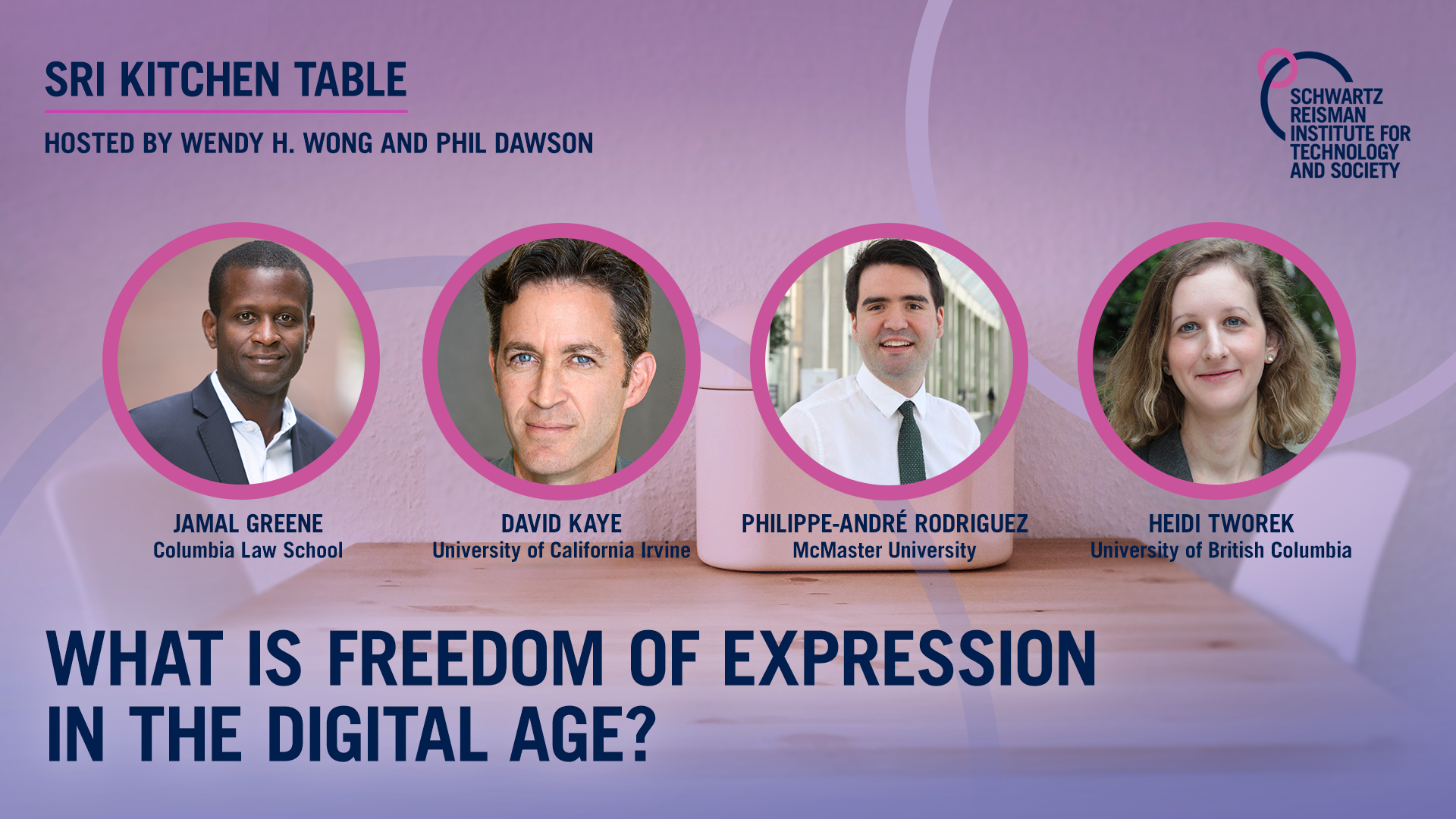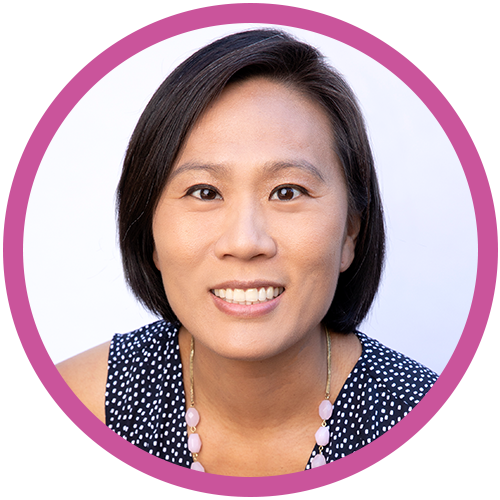Kitchen tables are typically places where people gather informally to exchange food. In our case, SRI Kitchen Tables will exchange food for thought. We seek to bring together key thought leaders to advance conversations around pressing issues in thought-provoking ways. We want to keep these Tables informal and collaborative so we can get to the heart of how human rights matter in our data-intensive and algorithmically-informed world, and what challenges lay ahead of us. After all, the human rights concerns raised by emerging technologies affect us all.
In this session, SRI Research Lead Wendy H. Wong and Policy Lead Phil Dawson will explore how freedom of expression has been transformed by digital technology. Questions asked will include:
Have Big Data and AI changed everything we know about freedom of expression?
With new policy changes being considered, what can we expect to change, and what can we expect to stay the same with norms and practices around freedom of expression?
WITH Featured Guests:
Jamal Greene, Dwight Professor of Law at Columbia Law School.
David Kaye, clinical professor of law at University of California Irvine, and former United Nations Special Rapporteur on the promotion and protection of the right to freedom of opinion and expression.
Philippe-André Rodriguez, deputy director of the Center for International Digital Policy at Global Affairs Canada, and professor at McMaster University.
Heidi Tworek, associate professor of international history and public policy at the University of British Columbia.
About the participants
Jamal Greene is the Dwight Professor of Law at Columbia Law School, where he teaches courses in constitutional law, comparative constitutional law, and the law of the political process. Greene is the author of How Rights Went Wrong: Why Our Obsession With Rights Is Tearing America Apart, as well as numerous articles and book chapters on constitutional law and theory. He is also a co-chair of the Oversight Board, an independent body that reviews content moderation decisions on Facebook and Instagram. He served as a law clerk to the Hon. Guido Calabresi on the U.S. Court of Appeals for the Second Circuit and for the Hon. John Paul Stevens on the U.S. Supreme Court. He earned his J.D. from Yale Law School and his A.B. from Harvard College.
David Kaye is a clinical professor of law at the University of California, Irvine, and served as the United Nations Special Rapporteur on the promotion and protection of the right to freedom of opinion and expression from 2014 to 2020. His book, Speech Police: The Global Struggle to Govern the Internet (2019, Columbia Global Reports), explores the ways in which companies, governments and activists struggle to define the rules for online expression. Kaye has reported to the United Nations on COVID-19 and freedom of expression, online hate speech, implications of AI on human rights, global private surveillance, repression of freedom of expression, encryption and anonymity, the protection of whistleblowers and journalistic sources, roles and responsibilities of private Internet companies, and regulation of online content. After his undergraduate and graduate work at the University of California, Berkeley, Kaye joined the U.S. State Department as a lawyer in 1995. In 2002, while the principal lawyer for international humanitarian law at the State Department, he was an advocate inside government for application of the Geneva Conventions to detainees captured by U.S. forces in Afghanistan. In addition to his work on human rights and freedom of expression, Kaye’s research and writing have focused on accountability for serious human rights abuses, international humanitarian law, and the international law governing use of force. A member of the Council on Foreign Relations and former member of the Executive Council of the American Society of International Law, Kaye has also published essays in Foreign Affairs, The New York Times, The Guardian, Reuters, Slate, Foreign Policy, JustSecurity and The Los Angeles Times.
Philippe-André Rodriguez is the deputy director of the Center for International Digital Policy at Global Affairs Canada, and a professor of practice at McMaster University. Among other current responsibilities, he acts as the head of the Canadian Delegation on processes related to the global governance of digital technologies at UNESCO, the Council of Europe, and engagement at the UN Secretary General Roadmap for Digital Cooperation and the Freedom Online Coalition. Rodriguez previously served as senior advisor at Canada’s Privy Council Office on issues related to the governance of digital technology, artificial intelligence, and online platforms. Prior to joining the Canadian government, he was a Fellow at Yale Law School, and completed a DPhil at the University of Oxford as a Rhodes Scholar. His research has been published in Cambridge Review of International Affairs, European Review of History, and Human Rights Review, among others.
Heidi Tworek is an associate professor of international history and public policy at the University of British Columbia. She is an award-winning researcher of media, history, health communications, international organizations, and platform governance. She is a senior fellow at the Centre for International Governance Innovation, where she writes a monthly column. She is also a non-resident fellow at the German Marshall Fund of the United States and the Canadian Global Affairs Institute, and a co-editor of the Journal of Global History. She has testified before and advised governments around the world on hate speech, disinformation, and platform policy.
Phil Dawson is a lawyer and public policy advisor specializing in the governance of digital technologies and artificial intelligence. After beginning his career in litigation, Dawson held senior policy roles at a United Nations specialized agency, in government, and at a global AI software company. As an independent consultant, he has advised governments, international organizations, research and advocacy organizations, nonprofits, and private companies on a range of issues, including responsible AI, foreign policy and global governance, digital competition, platform governance, tech and human rights, national AI strategy development, standardization, and international trade. Dawson served as co-chair of the Canadian Data Governance Standardization Collaborative, and is a member of Standards Council of Canada’s National Standards Strategy Advisory Committee, the OECD.AI Network of Experts, the UN Global Pulse Expert Group on the Governance of Data and AI, and a former member of the World Economic Forum’s Global Council on the Future of Human Rights and the Fourth Industrial Revolution. Dawson holds a BA from McGill University, an MSc in Comparative Politics from the London School of Economic and a joint BCL / LLB from McGill University. Phil is a member in good standing of the Barreau du Québec.
Wendy H. Wong is a professor of political science, Canada Research Chair in Global Governance and Civil Society, and a research lead at the Schwartz Reisman Institute for Technology and Society at the University of Toronto. She served as the Director of the Trudeau Center for Peace, Conflict, and Justice at the Munk School of Global Affairs and Public Policy from 2012-2017. She earned her PhD from the University of California, San Diego. Wong has published in a variety of academic venues, primarily about the contours of international human rights, the political effects of nongovernmental organizations (NGOs), and how variations in organizational structure change the effectiveness of non-state actors in global affairs. Both of her previous books were recognized with the top prize from the Association for Research on Nonprofit Organizations and Voluntary Action. Wong is currently working on a book that explores how datafication affects human rights, and why we need to reboot human rights now more than ever as our lives become increasingly defined by data.
About SRI Kitchen Tables
Kitchen tables are typically places where people gather informally to exchange food. In our case, SRI Kitchen Tables will exchange food for thought. We seek to bring together key thought leaders to advance conversations around pressing issues in thought-provoking ways. We want to keep these Tables informal and collaborative so we can get to the heart of how human rights matter in our data-intensive and algorithmically-informed world, and what challenges lay ahead of us. After all, the human rights concerns raised by emerging technologies affect us all.
SRI Kitchen Tables run for 90 minutes, and will consist of participant remarks, followed by a moderated discussion with the Kitchen Table organizers, and then an audience Q&A.








